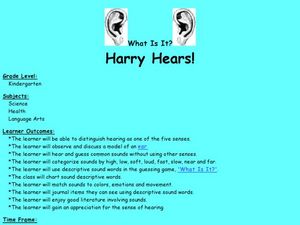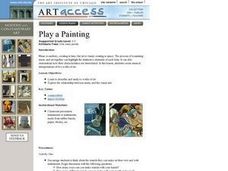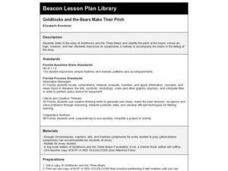Curated OER
Groovy 60s Dances!
1960s dances: The Twist, The Jerk, The Swim, The Monkey, The Mashed Potato, The Watusi, The Hitchhiker, and The Boog-a-loo. Introduce your class to the dances of the 60s. Find Motown music, watch online videos that show the different...
Curated OER
Vibrations
Sixth graders use rubber bands, textbooks, pencils, rulers and yo-yos to experiment with the concept of vibrations. They observe changes in pitch according to the speed of vibrations and record their observations in a journal.
Curated OER
Harry Hears!
Students explore ear anatomy and the sense of hearing. In this hearing lesson plan, students discuss the five senses and view a model of an ear. Students place cotton balls in their ears to simulate loss of hearing. Students use...
Curated OER
Play a Painting
Young scholars examine music and art together and see the distinctive elements of each form. It can also demonstrate how their characteristics are interrelated. They create musical interpretations of two works of art.
San Francisco Symphony
The American Five - Pentatonic scales in early American melodies
Through vocal warm-ups and exercises, budding musicians will attempt to grasp the five pentatonic scales, commonly used in early American songs. They'll sing and work to identify the pitch, tone, melody, and scales being expressed in the...
Curated OER
Bones or No Bones?
Students move to music and study bones and their purpose. When the music plays slow, gentle sounds the students have NO bones and their bodies are like Jello or an egg that has been cracked open on the floor . When the music changes...
Curated OER
Glass Slipper Bullies
Students identify bullying behaviors through this cross curricular music and character education lesson. Learners read the story Cinderella and discuss how the stepsisters demonstrated bully behavior. Students create a new ending for the...
Curated OER
Bells 'n' Scales
Students work together to arrange bells in order from low to high and play songs. They discuss differences in pitch and musical notation.
Curated OER
The Choir
In this music worksheet, students read an excerpt about the choir, the oldest of all musical groups. They identify that human voices vary in pitch, some high and some low, making it possible to sing harmonies in different layers.
Curated OER
Dynamics
First graders review Frere Jacques and perform crescendos and decrescendos. In this music lesson plan, 1st graders also learn about the dynamics of music including piano, forte, mezzo piano, and mezzo forte.
Curated OER
Goldilocks and the Bears Make Their Pitch
First graders listen to the story of Goldilocks and the Three Bears and identify the pitch of the bears' voices as high, medium, and low. They improvise on xylophones a melody to accompany the bears in the telling of the story.
Curated OER
Exploring the Brass Family
Third graders explore the four basic instruments of the Brass Family in the four lessons of this unit. The French horn, trumpet, trombone, and tuba are inspected as students develope a familiarity with their sight and sounds.
Curated OER
The Clarinet Family- Grades 4-5
In this music worksheet, students learn about the clarinet family of woodwind instruments by looking at the 3 types of clarinets in a picture and completing 5 questions. There is no information on the page.
Curated OER
Lesson Connections
Second graders listen to, analyze, and describe music. They are assessed as to whether they are distinguishing between A and B sections through different types of music. Students imitate echo, motive, phrase and AB or ABA. Finally,...
Curated OER
Being Shadowed
What causes a shadow to appear? Have kindergartners and first graders explore shadows with a fun science activity. After reading a short paragraph about light sources, they draw a shadow for a little girl based on the location of the...
Curated OER
Pitch Drills
Stduents reinforce pitch recognition. Changing passing tones to hums and later to just thinking them in the mind s ear, the pitch phrase is reduced to the skip or interval desir
Curated OER
Clerihew Dances II
Third graders explore rhythm and quality of word and phrased to that of dance. They move to the rhythm of poetry.
Curated OER
Back To School Crossword
In this reading worksheet, students analyze 10 words which pertain to Back to school time. Students read clues and fit the words in the crossword puzzle.
Curated OER
Tree Friends
Students are introduced to tree structure and use. They identify their special tree using all senses except sight. Students identify six different internal parts within a cross section of tree trunk (bark, phloem, xylem, cambium,...
Curated OER
What is Opera? Fill in the Blank
For this opera worksheet, students fill in 17 blanks in an essay that explains the composition of an opera. They use the words given in two word banks which include recitative, chorus, solo, ensemble, scenes, aria, and duet.
Curated OER
Science Test B-Grade 4
In this grade 4 science test worksheet, 4th graders complete a 30 question multiple choice quiz covering a variety of grade 4 concepts.
Curated OER
Literature Soundtracks
Student choose ten songs to create a soundtrack for a novel read in class or as outside reading. In the liner notes, instead of lyrics High schoolers writes a rationale of why or how the song relates to the novel in terms of setting,...
Alabama Learning Exchange
Alex: High Sounds and Low Sounds
Through this instructional activity students will sing and recognize high and low sounds and sort pictures of objects that make high or low sounds.
Alabama Learning Exchange
Alex: Vibrations of Sound
Lesson about sound waves of high and low sounds. Students learn through a website, activites with rope, rulers and rubber bands on cups, and with Audacity software. Lesson is written for early elementary music students but could also be...























